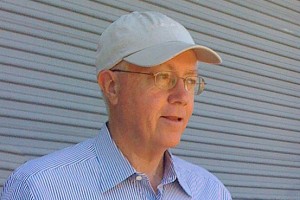How To Be a Silicon Valley Lawyer: A Tribute to Craig Johnson
by Scott Edward Walker on December 15th, 2010Background
I began my legal career as a corporate-transactional lawyer at two major law firms in New York City. After nearly eight years, however, I realized I wanted to spend the rest of my life helping entrepreneurs (like my father), not executing large, complex transactions for multi-national corporations and private equity funds. So I moved to California and launched my own boutique corporate law firm specializing in the representation of entrepreneurs.
The first thing I realized here in California was that my role as a corporate lawyer representing entrepreneurs was far different than the role I played in New York. Indeed, I had not developed the skill set to effectively represent entrepreneurs. Accordingly, I started searching for books, articles and other resources that might be helpful in connection with my new role.
That is when I found Craig Johnson. He wrote a chapter in the book, The Silicon Valley Edge: A Habitat for Innovation and Entrepreneurship. The chapter is entitled “Advising the New Economy: The Role of Lawyers.” In fact, I was so impressed with Craig’s insight and advice that I contacted him via email. Here is our initial correspondence:
From: Scott Edward Walker
Sent: Thursday, October 04, 2007 3:30 PM
To:
Subject: The Silicon Valley Edge
Hi Craig — I just wanted to drop you a note to tell you how much I enjoyed your contribution to the above book. I particularly appreciate the line “starting companies is a lot like launching rockets: if you’re a tenth of a degree off at launch, you may be a thousand miles off downrange” — which strikes a chord with the engineers. I am a former big-firm New York corporate lawyer and moved to SoCal approximately two years ago to devote my practice to helping entrepreneurs. Many thanks for your insight.
Best regards,
Scott
From: Craig Johnson
Sent: Thursday, October 04, 2007 3:35 PM
To: Scott Edward Walker
Subject: RE: The Silicon Valley Edge
Scott,
What a nice note! I’m no longer practicing law and am doing seed VC investing in Palo Alto. See www.c2cventures.com. When you’re next in Palo Alto give me a call and maybe we can get together. Note my new email address – .
Best,
Craig
Sadly, Craig passed away about a year ago.
Who Was Craig Johnson?
As this Wall Street Journal article reports, Craig graduated from Yale University and then served in the Peace Corps in Ethiopia, where he distributed smallpox vaccine. He returned to the United States in 1970 and worked as a computer programmer at Burroughs Corp. in Pasadena before enrolling in Stanford Law School.
Craig’s legal career began in 1975 at Wilson Sonsini Goodrich & Rosati in Palo Alto. In 1993, he quit Wilson Sonsini with 13 other attorneys to launch Venture Law Group, which exploded with the tech boom and grew to more than 100 lawyers — raking in millions of dollars with its investments in clients like Yahoo and Hotmail.
Venture Law Group stuggled when the bubble burst and was acquired by Heller Ehrman in 2003. Craig then became a venture capitalist and launched Concept2Company Ventures. It was in 2007 that I contacted him and later learned, much to my surprise, that we shared the same vision: a new business model for the legal profession. Indeed, we both realized that if you stripped-out the huge overhead costs of the traditional law firm (i.e., fancy offices, large support staffs and expensive associates), you could pass the substantial savings onto your clients. I figured this out in New York; he figured it out in Silicon Valley. I launched Walker Corporate Law Group; he launched Virtual Law Partners.
What Did I Learn From Craig?
Craig identified five key roles that the startup lawyer must play. Below are excerpts from his book chapter.
1) Business Advisor. As Craig noted:
Although start-up lawyers in Silicon Valley draft documents and follow form books . . . , they usually play a much larger role in the businesses being started. They are often dealing with people with very limited or no business experience. These people need help in defining and pursuing their business goals. . . . How should the founders divide the initial stock ownership? Who should be on their board of directors? Which financing sources should they consider? At what valuation and on what terms? Is their business strategy sound? How should it be modified? What should they do first? Second? Not at all? The start-up lawyer is writing on a clean slate, and there are no clear rules. Most of these questions have significant legal components, so the entrepreneur tends naturally to seek out the lawyer’s advice first.
2) Legal Advisor. This is obvious, but Craig stressed that:
Seemingly minor structuring or strategy mistakes at the beginning of a business can have very adverse effects later on. . . . [S]tarting companies is a lot like launching rockets: if you’re a tenth of a degree off at launch, you may be a thousand miles off downrange.
3) Coach. Craig discussed the emotional support a startup lawyer must offer his clients and pointed out that:
A good lawyer for an entrepreneur should play the role of coach. . . . It’s often lonely and frightening to the founder and their families to start a new business. They are giving up the security of well-paying jobs to live off their saving and seed capital. They need someone who has been successful with other businesses to believe in them and give them hope when things look bleak (as they will for almost all businesses some time or another). The relationships between the young clients and their lawyers are often emotionally close.
4) Networker/Introducer. Craig discussed the importance of a lawyer’s contacts and explained that:
A would-be entrepreneur (many of whom come from other countries) often lacks credibility and has great difficulty reaching the right people who can help the new business. By enlisting the services of an experienced business attorney and law firm, the entrepreneur can be introduced to potential investors and board members who otherwise would not be willing to spend the time.
Silicon Valley can be thought of as a network of networks, with certain people acting as gatekeepers. The successful business lawyer is one of the gatekeepers. Others in the network value their judgment and experience.
5) Facilitator. Finally, Craig emphasized the important role of facilitator that a startup lawyer must play:
A lawyer in a booming economic environment must facilitate transactions, not obstruct them. In more mature economic settings, in which fighting over the pie is more important than creating it, a litigator’s attitude and an ‘I win/you lose’ mentality may be common. But in environments like Silicon Valley, where wealth is being created much more quickly than it can be divided, lawyers are prized for their ‘win/win’ attitude and an ability to keep everyone focused on common goals and make things happen smoothly.
Conclusion
I leave you with a few quotes about Craig from The American Lawyer:
“He was constantly innovating, constantly thinking of new ideas and new systems dealing with startup law. . . . Every time I saw him he was working on something new — it was very much an ‘on the back of the napkin’ type of thing.” -Larry Sonsini, Chairman of Wilson Sonsini
“Craig was a pioneer in Silicon Valley, and his vision helped drive the growth of the technology industry.” -Jerry Yang, Co-Founder and former CEO of Yahoo
And my favorite: “He may have been a lawyer, but he was an entrepreneur at heart.” –John Dean, VC at Startup Capital Ventures.
Thanks, Craig – I’m carrying your torch.
Tags: Craig Johnson, entrepreneurs, lawyer, silicon valley, Stanford, startup, venture, Wilson Sonsini


I met Craig years and years ago when I lived in San Francisco and briefly in San Jose. Remember him as an extra-special guy. Was sad to read now of his passing.
Thanks
Very nicely done… I knew Craig well, he was an incredible mentor and we founded Grassroots together. We also did some cycling trips in France – Craig was a wonderful and collegial host of these epic trips across many parts of the world. Today I am a partner with John Dean at Startup Capital Ventures.
Thanks Tim